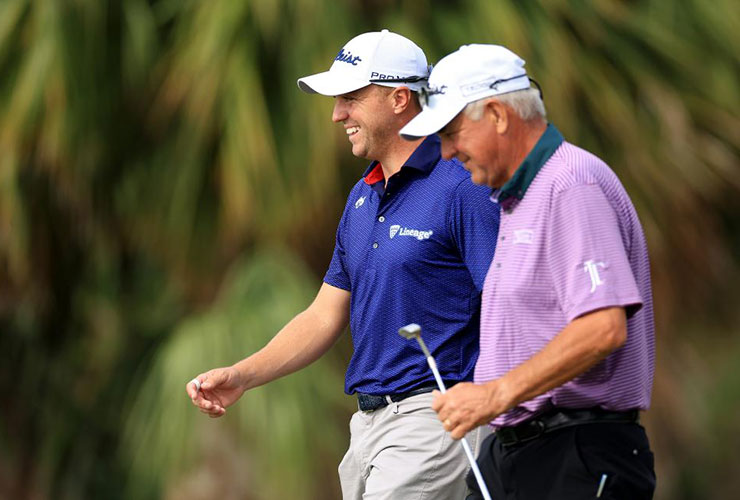ImagineGolf
If you’re a parent that loves to golf, it seems like a no-brainer to introduce your kids to the game, but how do you avoid becoming the ‘crazy golf parent’?
Be supportive, not pushy
First and foremost, golf should always be fun for your junior. We’re not saying that they have to be happy all the time, but practising, playing and even tournaments, should never feel like a job to them.
“When you see your junior start to take an interest [in golf], it’s so easy to want to start pushing,” Golf Digest Play Editor Luke Kerr-Dineen says.
But, no matter how hard you try, you’ll never be able to want it for them.
You can take them to practice, get them lessons and sign them up for tournaments, but if they don’t want it, it’s going to feel like work and all that pressure will create resentment.

Justin Thomas with dad Mike. David Cannon
Take it from Mike Thomas, Justin Thomas’ father, who once told Kerr-Dineen that the key is to keep it fun and to have them enjoy the game above all else.
“[He said] If they enjoy the good bits, then they’ll start enjoying the bad rounds too and the hard work that goes into it,” Kerr-Dineen says, “but the second you start pushing, that’s the moment things start toppling over.”
We know it’s just because you want the best for them, but you have to let them figure it out for themselves, Kerr-Dineen says.
It might even feel counter-intuitive to back off slightly when you see your kid take an interest in a sport, but it’s actually one of the best things you can do for them. That space will allow them to reflect on their own feelings, rather than being influenced by yours.
Setting goals sets them up for success
If there’s one thing that you should take away from this, it’s that a supportive parent is a good golf parent. Sometimes support looks like being there for them after a tough round or driving them to practice, but it can also come in the form of providing them with structure.
During a press conference last year at the PNC, Shawn Spieth, Jordan Spieth’s dad, talked about his approach to being a golf parent. He said there was one thing he did with Jordan during his junior career — and that was to have him set his own goals.
Shawn said that setting goals is something that successful people do, and that’s why he encouraged Jordan to create his own game plan.
Which we agree is sound advice.
Having your junior set their own goals will help you both to get on the same page, help you both maintain healthy expectations and keep them accountable so you don’t have to put pressure on them.
Don’t overestimate your ability to be their coach

Natnan Srisuwan
It might sound harsh, but, there are very few parents that can successfully toe the line between being their kid’s parent and golf coach. Odds are you aren’t one of them, and that’s OK.
Having separation between the title of parent and coach is actually a good thing for your junior. They’ll be more receptive to the critique, instruction and advice they’ll need to get better. Plus, you’ll avoid a lot of frustration in the process and won’t risk straining your relationship with them.
There are so many great coaches out there that it shouldn’t be hard to find the right coach for your junior.
Avoid falling into the trap of specialising too early
As a golf parent, it’s easy to buy into the idea that focusing solely on golf from a young age will yield the best results for your kid.
However, a study led by Neeru Jayanthi MD, a professor at Loyola Stritch School of Medicine, revealed that there’s no evidence that intense training at a young age is necessary to achieve elite level status.
While the study found that some degree of sports specialisation is needed for elite-level skill development, their research proves that intense training in a single sport to the exclusion of others should actually be delayed until late adolescence to optimise success, minimise injury, reduce psychological stress and avoid burnout.
And, top coaches and tour pro’s would agree with them.
“When you talk to a lot of coaches of really good players, or just good players themselves, often they’re the ones who didn’t specialise early,” Kerr-Dineen says, “Sure, they played golf when they were young but they also played baseball or basketball.”
It might be hard to do, especially when you see other parents pushing their kids to focus really early, but your player will thank you in the long run.









